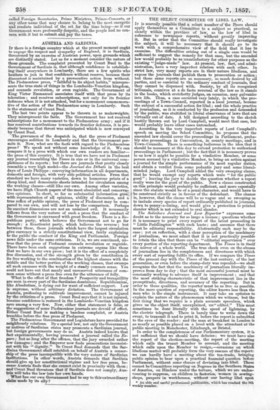AUSTRIA AND SARDINIA.
Ir there is a foreign country which at the present moment alight to engage the respect and sympathy of England, it 18 Sardinia, threatened by an exercise of Austrian power, upon grounds which are distinctly stated. Let us for a moment consider the nature of those grounds. The complaint presented by Count Buol to the Government of Sardinia is, that although confidence is establishing itself everywhere in Lombardy, there are a few spirits who hesitate to join in that confidence without reserve, because their discontent is maintained by a provocative action from without. The Piedmontese press, "faithful to its abject habits," misrepre sents the true state of things in the Lombardo-Venetian kingdom, and counsels revolution, or even regicide. The Government of King Victor Emmanuel associates itself with that press by its toleration ; and receives subscriptions, not only for its frontier defences when it is not attacked, but for a monument commemorative of the action of the Piedmontese army in Lombardy. Such is the statement of Count Thud.
The last two points appear to be thrown in as makeweights. They misrepresent the facts. The Government has not received subscriptions for a monument to the Piedmontese army ; and if it has received contributions towards its frontier defences, it is precisely because that threat was anticipated which is now conveyed by Count Buol.
The gravamen of the despatch is, that the press of Piedmont encourages sedition in Lombardy and that the Government permits it. Now, what are the facts with regard to the Piedmontese press P We speak not without some knowledge of it. We can compare it to a press with whioh our own readers are familiar— the press of this country. It is true that we have not in Piedmont any journal resembling the Times in size or in the universal completeness of its reports ; but there are journals that pretty closely resemble a very high model—the Journal des Debate in the best days of Louis Philippe ; conveying information in all departments, domestic and foreign, with very able political articles. From that standard we have many varieties, down to humorous faints of a cheap kind, and demooratie sheets intended for circulation among the working classes—still like our own. Among other varieties, we have High Church papers of the most absolutist and conservative opinions. In short, so far as substantial information goes, with representation of all opinions, ability of discussion, and a true reflex of public opinion, the press of Piedmont may be compared to our own, and will not lose by the comparison. Perhaps its succinct dimensions are not an unmixed evil. It necessarily follows from the very nature of such a press that the conduct of the Government is canvassed with great freedom. There is a Republican party, which believes the Government not to go far enough ; a Reaotionist party, which believes the reverse ; but between these, those journals which have the largest circulation give currency to a strictly constitutional view, fairly explaining to the public the conduct of the King and Parliament. Foreign news falls under the same criticism. It is, we are convinced, untrue that the press of Piedmont counsels revolution or regioide. There have been such suggestions in extreme organs like those that we have in our own press ; but it is the effect of a completely free discussion, and of the strength given by the constitution in its free working to the combination of the highest classes with the middle and the better portion of the working classes, that swamps all such excesses with the weight of a steady common sense. You could not have out that manly and unreserved utterance of common sense without a press free even for the utterance of folly.
What is the effect of that freedom ? Prosperity and tranquillity are seen in every part of the Sardinian dominions. Republicanism, like Absolutism, is dying out for want of sufficient support. Law is supreme, without arbitrary dictation. The Government of Austria, professing to cultivate improvement, cannot be injured by the criticism of a press. Count Buol says that it is not injured, because confidence is restored in the Lombardo-Venetian kingdom save among a very few. Now, either that statement is false, or the suggestions of some Piedmontese journals are devoid of effect. Either Count Buol is making a baseless complaint, or Austria trembles before the free press of Piedmont.
The Piedmontese Government and Legislature have provided for neighbourly relations. By a special law, not only the Government or natives of Sardinian states may prosecute a Sardinian journal, but foreign governments may do so. Austria indeed knows that fact experimentally, having prosecuted a journal called the Espero ; but so long after the offence, that the jury awarded rather low damages; and the Emperor now finds prosecutions inconsistent with his "dignity." ho Count Buol demands that the Sardinian Government shall establish on behalf of Austria a censorship of the press incompatible with the very nature of Sardinian Institutions. In other words, Austria demands that Sardinia should give up her constitutional r6g,ime and her free press, because Austria finds that she cannot exist in proximity with them; and Count Buol threatens that if Sardinia does not comply, Austria will take the law into her own hands.
What has our own Government had to say to this extraordinary alaim made by its ally ?


























 Previous page
Previous page